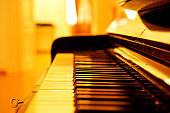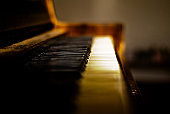
Hand Memory for Piano Playing
In this article, we will talk about how you can help stimulate muscle memory for piano. The first thing you will need in order to start stimulating muscle memory in your digits is a metronome. Metronomes are a musician’s greatest friend. They are the perfect tool for engaging muscle memory, as they help you to keep steady rhythm, which is the key to memorizing a pattern. Start off by playing slowly. This allows your fingers to adjust to the patterns being played. Keep your wrists loose and allow your digits to do the work. Never tense up. Tensing up will teach your fingers to tense up when playing. Everything you do, your fingers are already starting to memorize. Never speed up a pattern until you are full comfortable. If you speed up and you notice that your note values are off, or you are hitting other notes by mistake, it means that you are going too fast and your fingers aren’t properly prepared yet. If this is the case, slow it back down. Music should never be a race. Taking your time to do things properly is the only right way to play.
A great tool in muscle memory is repetition. Never stop playing a pattern just because you played it perfectly once. Keep bringing the pattern back and working on it. Repetitive motion is the equivalent of weight lifting for your fingers. You are training your fingers in a specific movement. Each repetition makes them slightly better at it. Don’t expect results overnight. Piano isn’t a miracle instrument; you get out what you put in. Your level of dedication and amount of practice determines how quickly you progress as a musician. Don’t mistake this for the farther you push yourself, the better. In some cases, it is best to hold back a bit when playing. This will prevent you from exhausting yourself. Any musician can tell you how exhausting learning an instrument can be. You are training fine motor skills as well as your brain. This is a lot of work on your body, and it can be fairly taxing. Rest is as important as practice. Getting a good night’s sleep can do more for your playing than spending your entire night practicing the piano. This is because you are allowing your body to recuperate from the stress you have put upon it throughout the day. Coming back to your instrument the next day fully refreshed will allow you to work harder for a longer period of time.
=> http://pianoplayerworld.com/GospelPiano101.html
| ||||
|
Although every attempt has been made to make information as accurate as possible, we are not responsible for any errors that may appear.
 No matter how much you practice, and how much you listen, all of music comes down
to one thing; muscle memory. The ability to memorize movements is one of our body’s greatest gifts. It allows
us to play sports, games, instruments, as well as many other things.
No matter how much you practice, and how much you listen, all of music comes down
to one thing; muscle memory. The ability to memorize movements is one of our body’s greatest gifts. It allows
us to play sports, games, instruments, as well as many other things.
 If you are working on
If you are working on 



